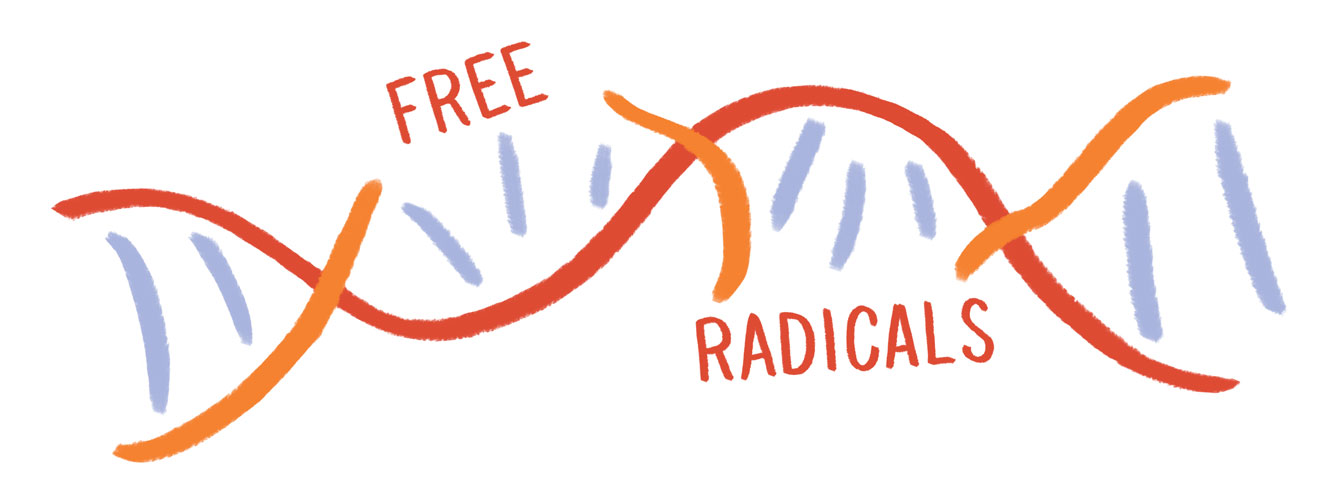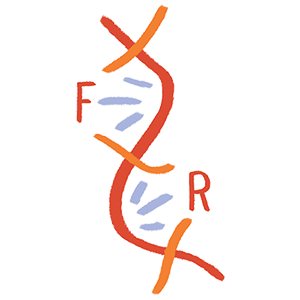
A digital illustration of the corner of a concrete building looming into perspective. The capitalized text “HALOMORPHIC”, a scientific term describing something created in the presence of alkali salts, covers the left wall. “HEGEMONY”, a term used to describe the power and privilege held by select few groups in society, is plastered on the right. A small, lone street post marks the intersection of the two walls and serves to heighten the impressiveness and seemingly impenetrable nature of the words’ complex use and meaning. Artwork by Art Li .
Part of the reason I wanted to be a scientist growing up was to distance myself from my parents, both of whom are more humanities-oriented in profession. My dad, a professor of English Literature, had always been an eloquent wordsmith and made a concerted effort in my youth to pass that mastery to me. Like any good son, I fled in the opposite direction and chose to study science, a field I thought to be devoid of words. I came to realize later on in life that this perception was more than slightly misguided. Although science does not rely on the same kinds of language that the arts or humanities do, it does use language that emphasizes numbers and objectivity.
Beyond my desires to escape the expectations of my family, I found the language of science appealing because of its power in crossing over boundaries of understanding. Science is touted as a universal, objective language of reason and logic that forgoes subjectivity to create neutral environments of learning and communication. Proof is provided with the words of statistics – large sample sizes and significant correlation preferred. This emphasis can blind science to things that cannot be easily measured. Science does not have precise words for understanding concepts like fun, leadership, or trauma, and the scientists who do attempt to measure and study these phenomena are often designated as social scientists, somehow distinct from the rigor and prestige of “hard” science. Science further struggles to put words to the implications of race, gender, and other forms of identity. In many ways, these concepts are ones that people have intuitive understandings of, deep emotional connections to, and highly personal experiences with. The language of science needs to develop better ways of incorporating this subjective and qualitative information. While efforts to group and measure the effects of racial discrimination undoubtedly contribute to our knowledge on race, the distinct experiences of those directly affected by racism are also critical to our understanding, even if they are less quantifiable.
Although the objectivity of scientific language had been reassuring in the past, in college I felt betrayed by its inability to help me contextualize my person and self. At that time I was undergoing an identity crisis and was desperately seeking out ways to understand what being Asian American meant, but the words I was learning in class – GFP, phosphorylation, among others – had little to no bearing on my angst. In their place, I sought out new language to put words to my experiences. The words I learned about in social justice spaces – model minority, toxic masculinity, and more – became the words I relied on to express and communicate the ideas that I had such difficulty talking about in scientific contexts. These words had such deep personal resonance it felt as if I was learning the names for things that I already knew – an experience that was incredibly empowering and gratifying for me.
However, familiarizing myself with the language of social justice was (and still is) a challenging process. Very much like science, social justice language relies on an understanding of foundational phrases and terms. Without this knowledge, I found myself struggling to understand the intricacies of what my peers discussed. Marxism sounded scary, I didn’t know what disability justice was, and the nuances of queerness and its implications were lost on me. I also felt a constant, unspoken, and often internalized pressure to prove myself through competent use of the language, as if I was undeserving of respect if I couldn’t rattle off five forms of power and privilege.
This problem is something the worlds of social justice and science share – knowledge of specialized language can inaccurately come to represent the knowledge a person has about the subject. Knowing how to talk scientifically is a requirement for being considered a reputable researcher, whereas people who draft eloquent Facebook statuses dismantling prejudice are often held in high regard in social justice circles. Both communities rely on language for convenience and utility – not having to explain what CRISPR stands for every other sentence is certainly beneficial for scientists, while repeatedly explaining what privilege means in a social justice context is exhausting. Yet, social justice language also demands this accuracy as a matter of respect for others – mis-identifying people with the wrong words is more than just incorrect and can be demeaning or silencing. People who misuse the language of science are shamed by the scientific community as not being scientifically literate. People who misuse the language of social justice are shamed by the social justice community for disrespecting experiences that others hold very dearly.
Furthermore, this adulation of correct language use has differing implications, as people who can accurately speak the language of science are granted a degree of publicly accepted social capital not afforded to those adept with the language of social justice. “Studies show” that speaking scientifically lends you legitimacy and authority, given the amount of reverence with which our culture treats science. Meanwhile, mastery of the language of social justice is only really valued in social justice spaces and can be viewed as overly radical or polarizing when used outside of said spaces. The perceived authority of science language also lends itself to abuse; plenty of the scientific “information” that surfaces in mass media is based on misinterpretations of narrow research results that become incorrectly accepted as fact. On the other hand, social justice language is often deliberately misrepresented in media to delegitimize issues of injustice. In other words, science language is abused to create false credibility, while social justice language is abused to deny credibility to those seeking to claim it.
This is not to say that social justice language is ideal and science language should be done away with – while social justice language centers the personal and values emotion and intuition in ways that science language does not, its emphasis on subjectivity can lead to its own unique set of difficulties. This subjective nature means that communicating across lines of identity can raise questions with no easy answers instead of building a shared understanding of human experience. Whose subjective experience is more valuable or appropriate to consider in which situations? When there is no metric for comparing emotional investment, how do people in social justice contexts make decisions for different and overlapping groups?
How can we address these challenges of language taken to objective and subjective extremes? Science, as evidenced by its language, needs to expand its conception of objectivity and better value qualitative analysis and information. The language of social justice can model science language’s intent to create broader frameworks for understanding across groups, even if a truly “universal” language may or may not be possible or appropriate in all situations. It is also important to understand the social and historical contexts of language usage in science and social justice. Scientists need to use the authority of their words to build a better understanding of science across all communities, rather than keeping scientific knowledge reserved for the privileged few who “make it” in the field. And a historical lens allows people communicating in social justice contexts to frame their individualities alongside the experiences of others, easing the challenges of a focus on subjectivity.
Ultimately, for scientists, the first step for creating a better, more inclusive culture of communication starts with the acknowledgement of how important words are to science, and how much power the language of science holds. In retrospect, running to science as a haven from the scariness of words was naive, as the massive social influence of scientific language and the complexity of its words proved hard to grasp indeed. It was a return to the realm of the humanities in the form of social justice that helped provide me with alternatives and practices to consider, and inspired a deeper consideration of scientific language itself. This return is something science as a whole needs to better its language practices, to revisit the subjective as an alternate source of information, and to reconsider the boundaries we draw between science and social justice.





